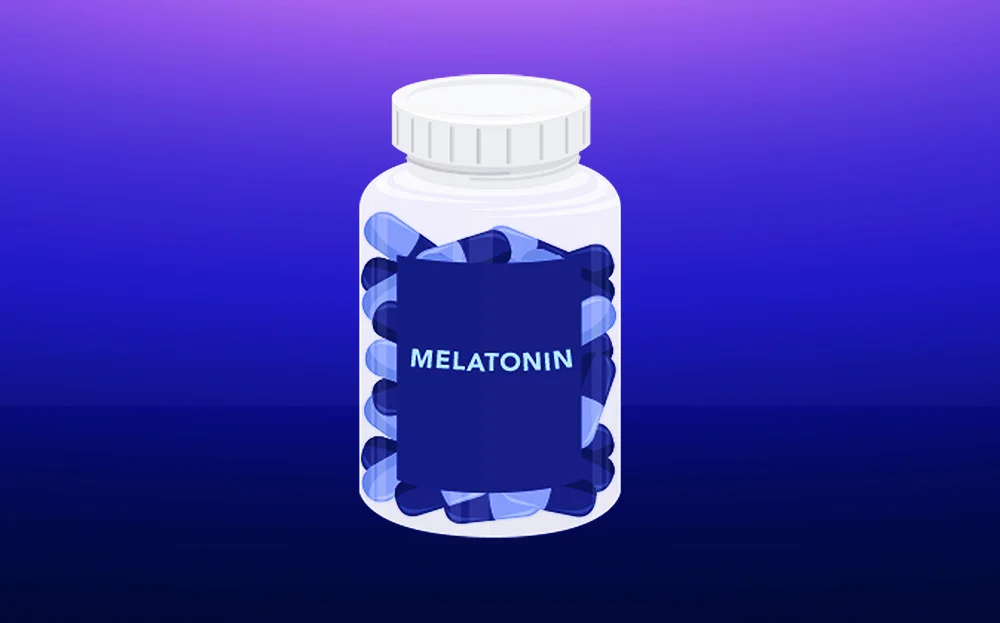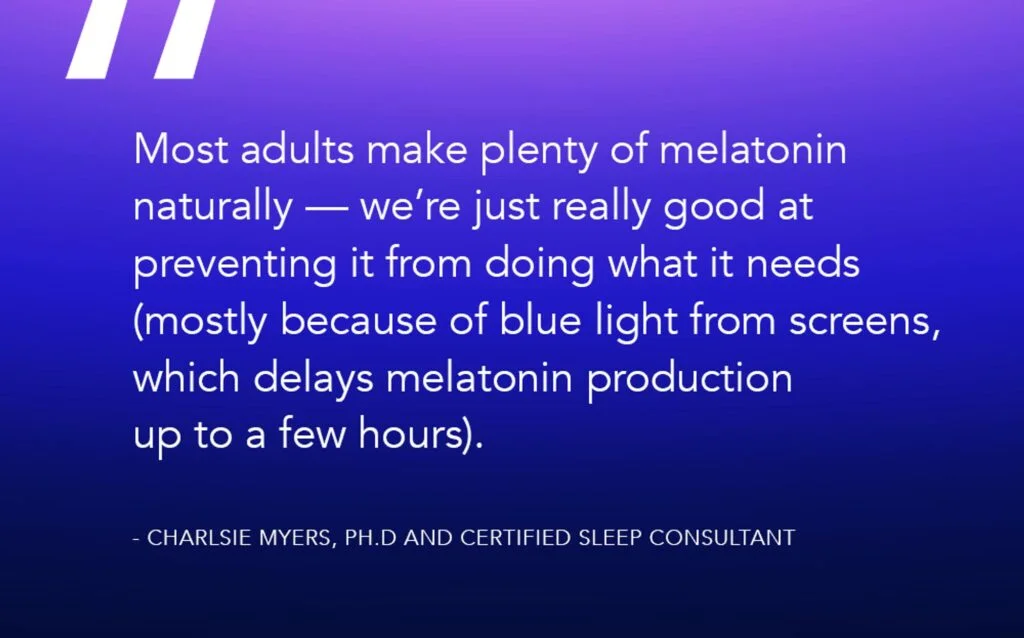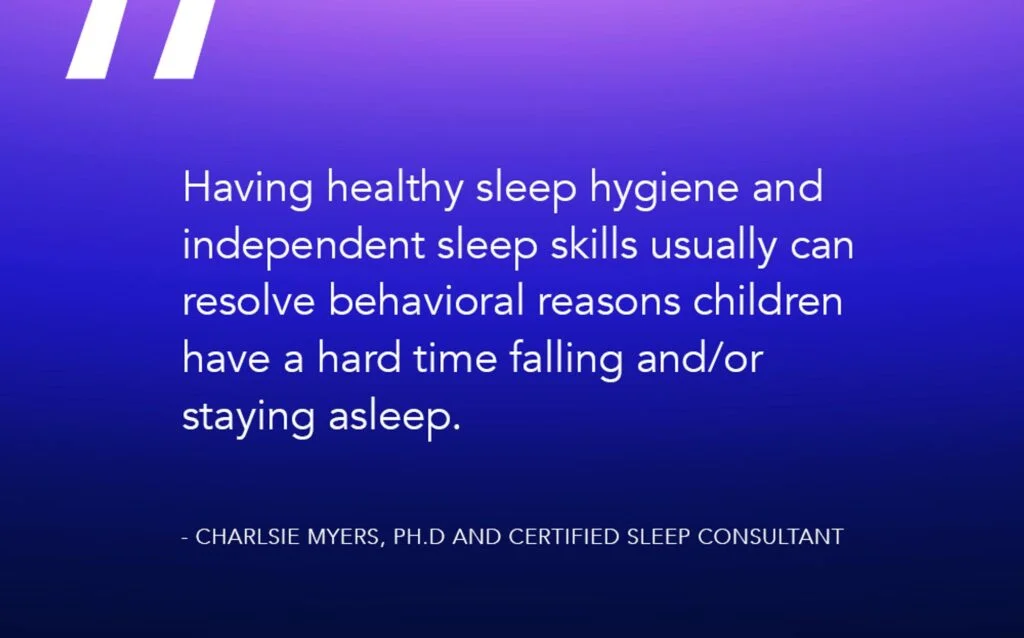
Melatonin is having its day in the spotlight as a quick and easy method for improving sleep. Seeing as some of us aren’t achieving the recommended 7+ hours of quality sleep per night, it makes sense that we’re checking out different sleep remedies. (1) But how well does melatonin work for sleep, how do you use it, and is it safe? We’re answering these questions and more about melatonin and sleep.
Note: The content on Sleepopolis is meant to be informative in nature, but it shouldn’t be taken as medical advice, and it shouldn’t take the place of medical advice and supervision from a trained professional. If you feel you may be suffering from any sleep disorder or medical condition, please see your healthcare provider immediately. Additionally, restrictions and regulations on supplements may vary by location. If you ever have any questions or concerns about a product you’re using, contact your doctor.
Long Story Short
- Melatonin is a hormone naturally produced in your brain that helps regulate your normal sleep-wake cycle.
- Melatonin is widely sold in supplemental form and only found in trace amounts in certain foods.
- Many adults and children have found success using melatonin to help improve their sleep, but it’s best used in low doses as directed by a healthcare provider, for a temporary period, and to address a short-term disruption in sleep versus an underlying medical or behavioral condition.
What Is Melatonin?
Long before it became a popular supplement you could pick up at the store, melatonin was simply a hormone produced mainly by the pineal gland, a small gland located in your brain. It plays a crucial role in regulating your sleep-wake cycle and is therefore often called the “sleep hormone.” (2)
Melatonin production is influenced by your body’s internal clock — also called the circadian rhythm — which responds to the daily patterns of light and darkness. Typically, melatonin levels rise in the evening as it gets dark, signaling to your body that it’s time to stop doom-scrolling and prepare to go to sleep. (3)
Charlsie Myers, Ph.D. and Certified Sleep Consultant, says “Most adults make plenty of melatonin naturally — we’re just really good at preventing it from doing what it needs (mostly because of blue light from screens, which delays melatonin production up to a few hours).”
In addition to its role in sleep regulation, melatonin also potentially acts as an antioxidant. In this regard, it’s been studied for potential benefits in things like supporting immune function and the aging process. (4) Due to its sleep-inducing properties, melatonin supplements may be commonly used to address sleep disorders or jet lag, helping people adjust to new sleep schedules or overcome disruptions in their circadian rhythm.

Today, of course, we’re familiar with melatonin capsules or gummies that people add to their (or their children’s) sleep regimen. While supplemental melatonin can have a place when properly used, it’s important to remember that it’s not a long-term solution — as there is a lack of long-term data — and doesn’t address the underlying cause(s) of poor sleep. (5) (6)
And though many of us instinctually trust what we can buy off our nearest convenience store’s shelves, like all supplements, melatonin is not regulated in the same way as pharmaceuticals, meaning that it’s possible for quality, purity, and even safety to be subpar depending on the product.
Can I Find Melatonin in Food?
You can find melatonin in food, but the likelihood that you’ll be able to consume enough to make you sleepy is another conversation. While trace amounts of melatonin have been detected in certain foods, such as fruits, vegetables, grains, and nuts, the levels are generally very low compared to what your body naturally produces (and needs to feel sleepy).
Some of the foods that contain trace amounts of melatonin include: (7)
- Cherries, especially tart
- Grapes, especially red
- Tomatoes
- Strawberries
- Bananas
- Oranges
- Pineapple
- Nuts, like walnuts, almonds and peanuts
- Grains, like rice, barley, and oats
- Certain dairy products
It’s important to note that consuming these foods in normal amounts won’t significantly impact melatonin levels in the body. Though there’s some evidence that tart cherry juice can help with sleep due to a variety of components, you’d have to eat a lot of bananas or tomatoes to even begin feeling an impact — and at that point, your sleepiness might simply come from a full belly.
When Can An Adult Use Melatonin Supplements?
Because you’re not going to find a ton of melatonin in food, many people turn to supplements, which are synthetically produced to mimic the hormone’s natural form. More people are becoming curious about melatonin and sleep, especially when facing challenges such as: (5)
- Occasional onset insomnia
- Jet lag
- Shift work sleep schedules
- Delayed sleep-wake disorder
- Anxiousness related to prep or recovery from surgery
- Catching up to daylight savings time
Whatever the reason, melatonin is not meant to be a long-term solution to your sleep problems. (8) If you’re experiencing trouble sleeping, it’s always best to talk to your healthcare provider. A melatonin supplement may be beneficial as a short-term solution, but other interventions may be necessary for longer-term challenges.
Melatonin Dosage by Age
Melatonin is an over-the-counter product in the United States, and its formulation can vary depending on the brand. Furthermore, some melatonin products are extended-release to help you stay asleep longer, while others are meant to help you fall asleep quickly. It’s important to read and understand the directions for use on the label of any product you use.
Myers says, “The key for melatonin to work effectively is to take the supplement around 1-2 hours before you need to fall asleep so it works like your naturally-produced melatonin would.”
Generally, the melatonin dosages by age are as follows: (9) (10) (11)
- Adults can usually take up to 8 mg per day, or up to 6 mg for older adults
- Infants may take up to 1 mg per day
- Children may take up to 2-3 mg per day
- Adolescents may take a slightly higher dose of up to 5 mg per day
Still, it’s always best to ask your healthcare provider about recommended dosages. It’s also important to note that the FDA does not regulate melatonin as a drug, which means standard dosing isn’t well-defined. (10) It also means purity and quality can vary, so it’s a good idea to look for melatonin products that bear a third-party testing seal from NSF International, U.S. Pharmacopeia (USP®), or Consumer Lab.
There’s a chance your 5 mg tablet might really contain 10 mg of melatonin — or even other ingredients that aren’t included on the label, so do your due diligence to the best of your ability. (This is why it requires a prescription in other countries, like the European Union.) (6)
It’s best to start with the lowest possible dose of melatonin — don’t jump right in with the highest dose you can find. Speak with your healthcare provider or pharmacist for questions regarding melatonin dosages, and exercise additional caution when it comes to giving children melatonin. (6)
Can Children Take Melatonin?
As parents and caregivers are well aware, many children have trouble falling asleep and staying asleep. This has promoted an increased interest in melatonin and sleep for kids.
While melatonin has become a widely used supplement, it’s too early to say that it’s totally safe to use for kids — especially as an ongoing intervention. Scientists say the data supporting the use of melatonin in otherwise healthy kids is limited in the United States. (12)
Additionally, there has been concern over melatonin overdose among children in recent years. (13) The Public Safety Committee and Public Awareness Advisory Committee of the American Academy of Sleep Medicine even published a health advisory around melatonin use for children due to the concern of overuse and variability in ingredients given how supplements are regulated. (14)
Furthermore, Myers says that while children can take melatonin, most don’t need it. What they do need is for underlying sleep issues to be identified and addressed. “Having healthy sleep hygiene and independent sleep skills usually can resolve behavioral reasons children have a hard time falling and/or staying asleep.”
If you are leaning toward introducing melatonin into your child’s nighttime routine for any reason, it’s important to speak with your child’s pediatrician before moving forward, especially if their sleep issues are ongoing.

Myers notes that a blood test can be done to determine whether natural melatonin production is low and needs to be supplemented, although this is not common. And if you do use melatonin, be sure to keep it under adult management and out of children’s reach.
Melatonin and Sleep: Side Effects of Melatonin Supplements
Side effects from using melatonin supplements can vary depending on the product, dosage, and length of time it’s being used. Read on to learn more about potential side effects to consider. (15)
Short-Term Effects
Most people tend to reach for melatonin when they’re combatting jet lag, trying to sleep in a new place, or dealing with a short stint of sleeplessness they’re looking to nip in the bud. Short-term use of melatonin, generally for a couple of weeks to a few months, is generally considered to be safe for most people. Some of the potential side effects of taking melatonin may include: (16)
- Headache
- Drowsiness
- Dizziness
- Agitation
- Increased bed-wetting among children
- Upset stomach
- Morning grogginess
- Short-term feelings of depression
- Reduced appetite
- Increased blood sugar and blood pressure
Myers notes that when melatonin is discontinued, these types of side effects should disappear for most people if they’re related to the supplement.
Long-Term Effects
The long-term effects of melatonin are not well understood, and more research is needed in this area as the interest in its use continues to grow. Some older research suggests that long-term melatonin use may reduce semen quality in healthy men, but again — more research is needed overall. (17)
Additionally, Myers says some speculate that because melatonin is a hormone, it’s possible that melatonin supplements could impact hormonal development in children, or that it could lead to melatonin dependence. However, there’s not enough data to support this. (18)
What research does say is that we don’t know enough about the long-term effects of melatonin use to become complacent in our supplementing habits — though it can feel like an easy fix for sleep issues, it’s important to remember that melatonin is still a hormone. (19)
Getting Your Sleep Back On Track Without Melatonin Supplements
When there’s an underlying medical reason for poor sleep, addressing this with your healthcare provider is key. Otherwise, there are several things you can do to help get your sleep back on track — without using melatonin.
Restoring a healthy sleep routine requires positive sleep hygiene practices and making adjustments to your lifestyle. Consider some of these approaches: (20) (21)
- Maintain a consistent sleep schedule, waking up and going to bed around the same time every day, even on the weekends. We know that last bit can be tough, but give it a try if you’re dealing with some short-term sleep challenges — you’d be surprised how much this simple change can help.
- Create a relaxing bedtime routine to signal to your body that it’s time to wind down. This may include activities such as reading, taking a warm bath, or giving your favorite asana a try and practicing some gentle stretches.
- Ensure your sleep environment is set up to give you a good night’s rest by keeping it cool, dark, and quiet. Consider using things like cozy bedding, breathable pajamas, a fan for white noise, or blackout curtains for extra darkness.
- Most people we know use screens in some capacity before bed, whether it’s to catch an episode of their favorite comfort show or to doomscroll the night away. Do your best to minimize exposure to screens at least an hour before bedtime, as the blue light emitted can interfere with the body’s production of melatonin. This includes your TV, cellphone, tablet, and the like — sorry!
- Avoid stimulants like caffeine and nicotine before bedtime, and opt for light, easily digestible snacks if hungry.
- Regular exercise can promote better sleep, but try to finish intense workouts at least a few hours before bedtime.
- If worries keep you awake, consider jotting them down in a journal before bedtime to help clear your mind.
By incorporating these habits and maintaining a consistent sleep routine, you can likely enhance the quality of your sleep without the need for medical intervention.
FAQs
Is 10 mg of melatonin too much?
According to available research,10 mg is on the high end of a daily dose for adults. Most adults can generally tolerate up to 8 mg of supplemental melatonin per day, though it depends on the individual and the product. If you’re not sure how much to take, or if you need it at all, speak to your healthcare provider. (10)
The Last Word From Sleepopolis
Melatonin and sleep seem to go hand-in-hand. For most people, a low and temporary dose can help get your circadian rhythm back on track. While melatonin is considered to be safe when used in this manner, more research is needed about potential long-term side effects.
Instead, consider other habits that can help improve your sleep, such as having a consistent sleep-wake cycle, avoiding technology around bedtime, and creating a sleep-promoting space. And of course, always speak with your healthcare provider to determine whether underlying factors may also be playing a role.
Sources
- How Much Sleep Do I Need? Centers for Disease Control and Prevention. Reviewed 14 Sept 2022. Available: https://www.cdc.gov/sleep/about_sleep/how_much_sleep.html
- Moon E, Kim K, Partonen T, Linnaranta O. Role of Melatonin in the Management of Sleep and Circadian Disorders in the Context of Psychiatric Illness. Curr Psychiatry Rep. 2022;24(11):623-634. doi:10.1007/s11920-022-01369-6
- Tan DX, Reiter RJ, Zimmerman S, Hardeland R. Melatonin: Both a Messenger of Darkness and a Participant in the Cellular Actions of Non-Visible Solar Radiation of Near Infrared Light. Biology (Basel). 2023;12(1):89. Published 2023 Jan 6. doi:10.3390/biology12010089
- Chrustek A, Olszewska-Słonina D. Melatonin as a powerful antioxidant. Acta Pharm. 2020;71(3):335-354. Published 2020 Dec 31. doi:10.2478/acph-2021-0027
- Melatonin: What You Need To Know. National Center for Complementary and Integrative Health. Updated July 2022. Available: https://www.nccih.nih.gov/health/melatonin-what-you-need-to-know
- Tuft C, Matar E, Menczel Schrire Z, Grunstein RR, Yee BJ, Hoyos CM. Current Insights into the Risks of Using Melatonin as a Treatment for Sleep Disorders in Older Adults. Clin Interv Aging. 2023;18:49-59. Published 2023 Jan 12. doi:10.2147/CIA.S361519
- Meng X, Li Y, Li S, et al. Dietary Sources and Bioactivities of Melatonin. Nutrients. 2017;9(4):367. Published 2017 Apr 7. doi:10.3390/nu9040367
- Kennaway DJ. What do we really know about the safety and efficacy of melatonin for sleep disorders?. Curr Med Res Opin. 2022;38(2):211-227. doi:10.1080/03007995.2021.2000714
- Janjua I, Goldman RD. Sleep-related melatonin use in healthy children. Can Fam Physician. 2016;62(4):315-317.
- Savage RA, Zafar N, Yohannan S, et al. Melatonin. [Updated 2022 Aug 8]. In: StatPearls [Internet]. Treasure Island (FL): StatPearls Publishing; 2023 Jan-. Available from: https://www.ncbi.nlm.nih.gov/books/NBK534823/
- Pierce M, Linnebur SA, Pearson SM, Fixen DR. Optimal Melatonin Dose in Older Adults: A Clinical Review of the Literature. Sr Care Pharm. 2019;34(7):419-431. doi:10.4140/TCP.n.2019.419
- Skrzelowski M, Brookhaus A, Shea LA, Berlau DJ. Melatonin Use in Pediatrics: Evaluating the Discrepancy in Evidence Based on Country and Regulations Regarding Production. J Pediatr Pharmacol Ther. 2021;26(1):4-20. doi:10.5863/1551-6776-26.1.4
- Lelak K, Vohra V, Neuman MI, Toce MS, Sethuraman U. Pediatric Melatonin Ingestions — United States, 2012–2021. MMWR Morb Mortal Wkly Rep 2022;71:725–729. DOI: http://dx.doi.org/10.15585/mmwr.mm7122a1
- Rishi MA, Khosla S, Sullivan SS; Public Safety and the Public. Awareness Advisory Committees of the American Academy of Sleep Medicine. Health advisory: melatonin use in children. J Clin Sleep Med. 2023;19(2):415
- Handel M, Andersen H, Ussing A, Virring A, Jennum P, Mol Debs N, et al. The short-term and long-term adverse effects of melatonin treatment in children and adolescents: a systematic review and GRADE assessment. eClinical Medicine, 2023; 61: 102083. https://www.thelancet.com/journals/eclinm/article/PIIS2589-5370(23)00260-2/fulltext
- Andersen LP, Gögenur I, Rosenberg J, Reiter RJ. The Safety of Melatonin in Humans. Clin Drug Investig. 2016;36(3):169-175. doi:10.1007/s40261-015-0368-5
- Luboshitzky R, Shen-Orr Z, Nave R, Lavi S, Lavie P. Melatonin administration alters semen quality in healthy men. J Androl. 2002;23(4):572-578.
- Boafo A, Greenham S, Alenezi S, et al. Could long-term administration of melatonin to prepubertal children affect timing of puberty? A clinician’s perspective. Nat Sci Sleep. 2019;11:1-10. Published 2019 Jan 31. doi:10.2147/NSS.S181365
- Besag FMC, Vasey MJ. Adverse events in long-term studies of exogenous melatonin. Expert Opin Drug Saf. 2022;21(12):1469-1481. doi:10.1080/14740338.2022.2160444
- CDC. Sleep hygiene tips – sleep and sleep disorders. Centers for Disease Control and Prevention. Published September 13, 2022. https://www.cdc.gov/sleep/about_sleep/sleep_hygiene.html
- Silvani MI, Werder R, Perret C. The influence of blue light on sleep, performance and wellbeing in young adults: A systematic review. Front Physiol. 2022;13:943108. Published 2022 Aug 16. doi:10.3389/fphys.2022.943108
- Chrustek A, Olszewska-Słonina D. Melatonin as a powerful antioxidant. Acta Pharm. 2020;71(3):335-354. Published 2020 Dec 31. doi:10.2478/acph-2021-0027
- Bondy SC, Campbell A. Melatonin and Regulation of Immune Function: Impact on Numerous Diseases. Curr Aging Sci. 2020;13(2):92-101. doi:10.2174/1874609813666200711153223
- Nabavi SM, Nabavi SF, Sureda A, et al. Anti-inflammatory effects of Melatonin: A mechanistic review. Crit Rev Food Sci Nutr. 2019;59(sup1):S4-S16. doi:10.1080/10408398.2018.1487927
- Yoo YM, Joo SS. Melatonin Can Modulate Neurodegenerative Diseases by Regulating Endoplasmic Reticulum Stress. Int J Mol Sci. 2023;24(3):2381. Published 2023 Jan 25. doi:10.3390/ijms24032381


























